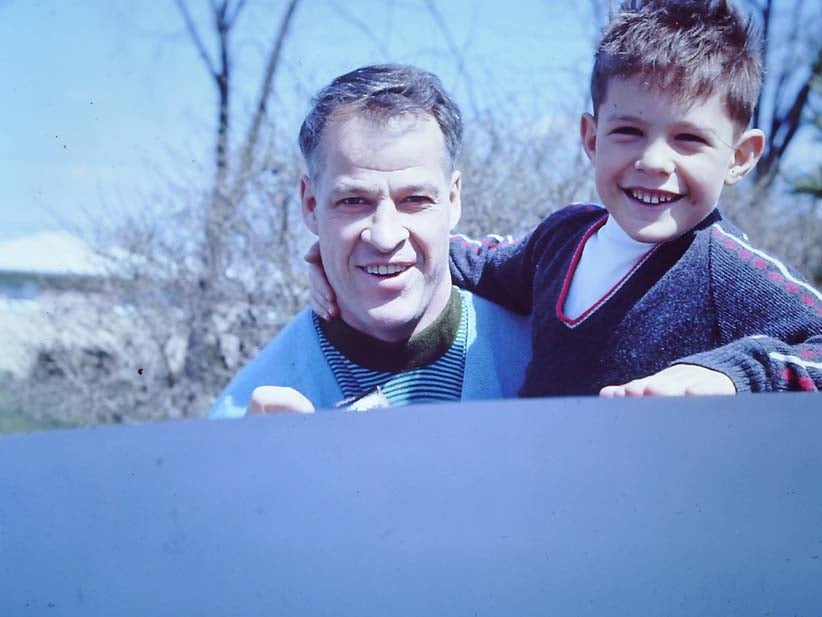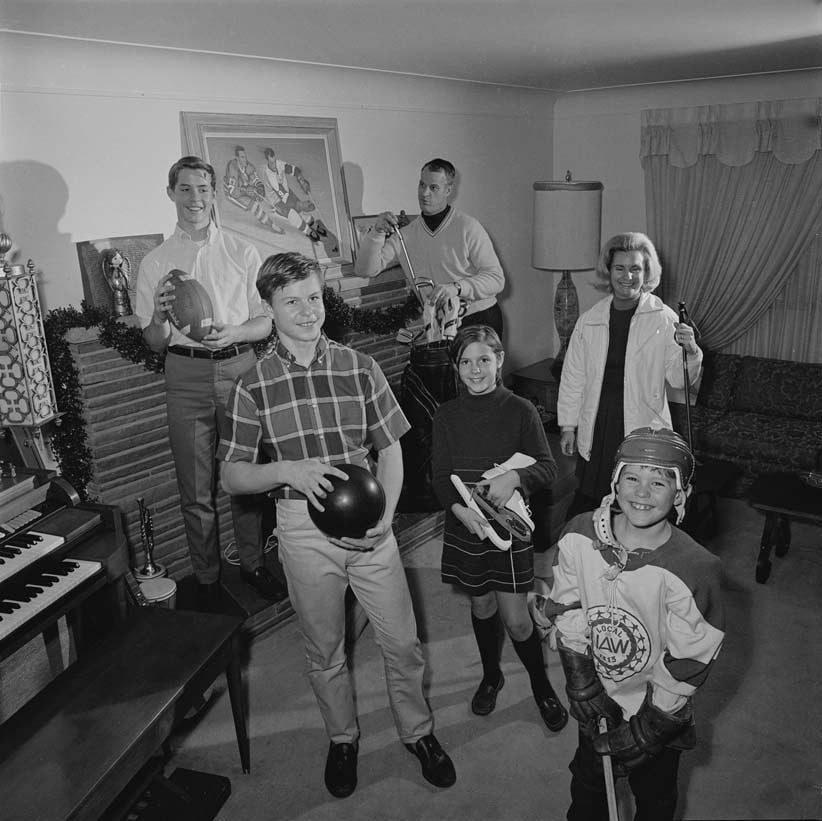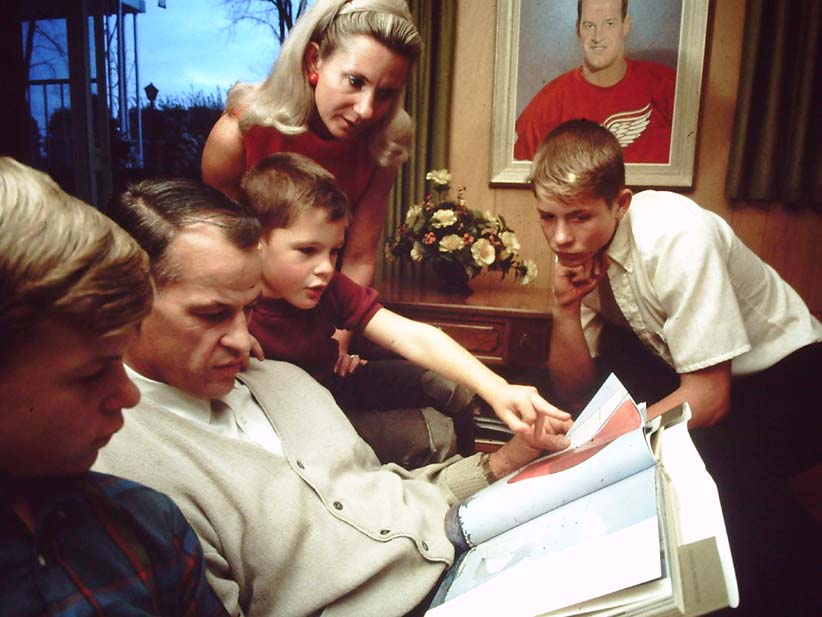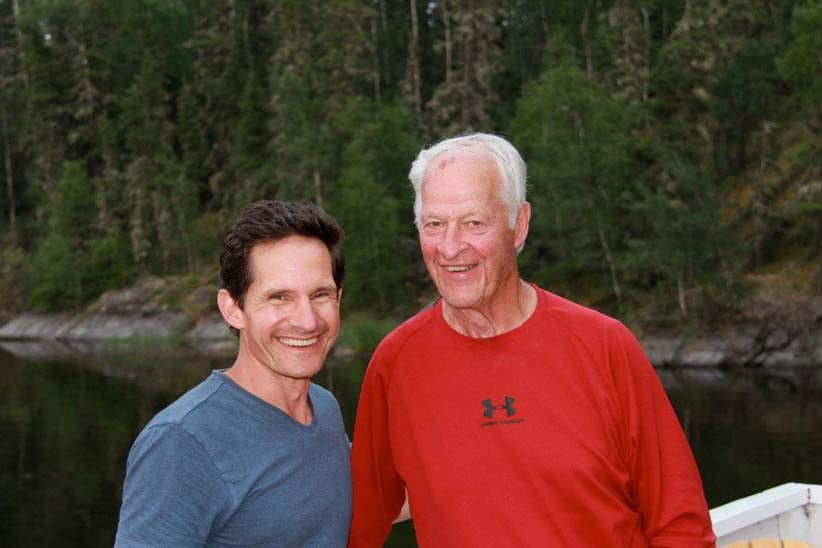When you’re Gordie Howe’s son, you learn some things
Dr. Murray Howe, in conversation with Wayne Gretzky, on being a good hockey parent, eating family dinners — and his father’s heart-breaking X-rays.
(Howe family)
Share

This conversation between Dr. Murray Howe and Wayne Gretzky, a close friend of Gordie Howe and the Howe family, took place in October as a precursor to the release of Howe’s new book, Nine Lessons I Learned from My Father. This edited transcript was provided to Maclean’s by Penguin Random House Canada.
Wayne Gretzky: I’ve said this many times: I was a huge fan of your dad’s when I was growing up, and I still am. One of the things I remember most is that even though he was a hero to me, when I met him he was even more impressive than I expected. You saw him almost every day as a kid, and know him about as well as anyone in the world. What did you see that others never would?
Murray Howe: I would like to preface this first answer by saying that I am just as honoured to be fielding nine questions from you, Wayne, as I was to write Nine Lessons I Learned from My Father. Admittedly, I was relieved to see that you chose nine questions instead of 99.
What did I see that others never would? His children were his greatest pride and joy. I was lucky to see that from the vantage point of a little boy. Dad could scare grown men, but he was endlessly, tirelessly playful. He loved to roughhouse, and by no means did he “baby” us.
One of my most indelible memories happened after tagging along with Dad to Olympia for the Red Wings’ practice. I was about five, and had the hallowed Wings ice surface all to myself while the players suited up. I was having a blast flying around the rink, the imaginary packed house cheering me on as I bobbed and weaved past invisible defencemen. Suddenly, my skates flew out from underneath me as if whacked by an invisible stick.
I heard a laugh echoing from the far end of the rink, and there was my dad, arms raised overhead in the gesture any hockey fan knows means “GOAL!” He had stepped onto the far end of the rink, still in his dress clothes, and fired a blistering wrist-shot that hit my skates mid-stride. Only Mr. Hockey could do that on the first try! I might be the only kid in history who enjoyed being knocked on his keister by his dad.
Gretzky: People think of Gordie Howe as the greatest hockey player in the world, but you and I both know him as a hockey dad, too. I remember meeting him when your brothers were in town playing the Brantford Majors, and I remember seeing him in the stands in Toronto when you and I were playing Junior B. Both times he was sitting with the other parents, signing a few autographs, but definitely not on some kind of pedestal. Just another proud father. Do you have any stories about Gordie Howe’s career as a hockey dad?
Howe: One of the best lessons Dad taught me was how to be a good hockey parent. He never pushed me to play. After each game he’d ask me, “Did you have fun?” He didn’t point out my mistakes or my teammates’. Instead, he’d identify at least one thing that I did well. Then he’d buy me ice cream. In addition, both he and Mom regularly reminded us that if it wasn’t fun, we should do something else; life was too short. Dad also never said a word while he was in the stands. Never shouted “Go get ‘em!” or “Shoot!” He let us play our game, and allowed the coach to do his job. Once, when he and I witnessed an overly zealous parent screaming at a child on the ice, Dad turned to me and said, “You know, my dad didn’t ever see me play hockey until I’d been with the Wings for many years. I played because it was fun, not because my parents wanted me to. If a parent wants to help his kid be a better hockey player, he doesn’t need to coach him. All he needs to do is let him know he’s proud of him.”

Gretzky: I feel lucky that my whole family got to know your father over the years. Whenever I ran into him, the first thing he would ask was, “How are your mom and dad?” It meant a lot to me that someone I idolized, and who my dad idolized, treated us with so much respect. Who did your dad look up to?
Howe: Dad looked up to his own brother Vern, who played hockey for the Canadian Army team, his brother Norm, who was a talented goalie, and also the many pros who made it to the big leagues from Saskatoon. One that stood out for Dad was Ab Welsh. Ab was a neighbour who played on Saskatoon’s semi-pro team. My dad would wait outside the arena hoping to carry in the skates for a player, as this was the only way for him to get into the game. He had no money for a ticket. Skates were so valuable that the players carried them separately from their hockey bag so that they wouldn’t get stolen. By the way, another Saskatchewan player who let my dad carry his skates was Sid Abel!
Another hero that stood out in Dad’s mind was Harry Watson, an NHLer who played for the Canadian Armed Services team during WWII (when the NHL was on hiatus). The team traveled around Canada playing exhibition games. When Dad was 14, he was asked to play on an “all-star” youth team that played against Mr. Watson’s team. Dad played like a boy possessed. The young Saskatoon team gave the armed forces team a run for their money. After the game, Harry Watson skated over to my dad. “How old are you, son?” he asked. My dad told him, and Mr. Watson said, “Well, I guess we’ll see you in the NHL!” Four years later Dad squared off against him at Olympia Stadium, and Harry winked at him and said, “I told you I’d see you here!” My dad cherished the moment so much that, often when he signed autographs for young hockey players, he honoured Harry Watson by signing “See you in the NHL.”
Probably Dad’s biggest hero and inspiration was his own mother, Katherine. She was incredibly strong physically, emotionally, and spiritually. She was unwaveringly positive, kind, generous, patient, and compassionate. The Gordie Howe we all know and love off the ice, that was a mirror image of my grandma.
Gretzky: When I was a kid my family sat down to dinner at 5:30 every night, when my dad got home from work. Things are pretty much the same in our house now. Family and friends mean everything to us, and I know it was the same with your parents. But spending time together as a family just gets harder as the world gets faster. What do you think your dad would say to families that don’t sit down to eat together because they’re too busy or too distracted?
Howe: He’d say, “Where’s the fire?” Then he’d laugh. Then he’d help them set the table, but he wouldn’t sit down until everyone else was seated. Then he’d explain to them that nothing is more important than family, and the two best opportunities each day to connect with your loved ones are over a meal, be it breakfast, lunch, or dinner, or at bedtime. He’d tell them that if you blink, someone you love might be gone, and you won’t have that chance to say what you needed to say to them. Then he’d tell them a funny hockey story, and end his visit by cleaning up their kitchen.

Gretzky: Murray, you’re a doctor. If you came across Gordie Howe’s X-rays, not knowing they belonged to your dad, what conclusions would you draw about the patient?
Howe: Great question, Wayne! I’ve seen Dad’s X-rays, CAT scans, and MRIs, and examined him extensively. He’s a medical phenomenon, that’s for sure. What is immediately obvious when reviewing his wrist and elbow X-rays is that this was a man who sustained unusual, high-energy trauma, such as is seen in a UFC fighter. Furthermore, the disorganized, chronically fragmented nature of the fracture deformities indicates that this person either could not feel pain, or had an incomprehensibly high pain threshold. If an X-ray like this came across my computer workstation I’d call my colleagues over to take a look, because the findings are so extreme. The fact that he played the last seven years of his professional hockey career with such injuries defies comprehension.
Gretzky: You say a couple of times in the book that part of what made your dad who he was came from growing up in the Depression. What do you think people today could learn from that generation?
Howe: Dad taught the Howe kids that people, not things, matter. That having too much isn’t a good thing. That what makes you rich are your connections with others, being able to help your family, friends, and neighbours. And spend time with them. This is what life is all about. During the Depression, communities pulled together to help one another. They depended upon one another. Everyone had a purpose, and felt a sense of responsibility to each other. Everyone learned to be resourceful, and nothing was taken for granted. This sense of community, of responsibility, and gratitude, this is what we need to cultivate in future generations to improve their quality of life.
Gretzky: Murray, we played on a line together for a while in Junior B, so we both know a bit about the ways players get along on a team. You and your brothers often call your dad by his first name. Can you tell me why that is?
Howe: Wayne, I will always treasure the thrill of playing as your line-mate, and of scoring my first Junior B goal off of your perfectly executed pass! Sadly, that was also one of my last goals as well. Sometimes having the name “Howe” just isn’t enough. I was lacking that other essential ingredient: talent!
In any case, to answer your question, Dad was conditioned to respond to the name “Gordie” on the ice, and not to the name “Dad.” My brothers Mark and Marty both played with him in the WHA and the NHL so they called him “Gordie” on the ice. I believe it was only after Dad specifically asked them to do so. On the other hand, since I didn’t play alongside him professionally, I was not invited to call him “Gordie.” I tried it once when I was about 13, just to be funny, but the look he gave me made it abundantly clear that I had just overstepped my boundaries. I never did it again.

Gretzky: One thing that really comes through in the book is that your dad helped a lot of people over the years. What do you think motivated him?
Howe: I think it was gratitude, pure and simple. He was so thankful for his parents, his siblings, his friends, his neighbours, his teachers, his coaches, his teammates, and the fans, for helping him to fulfill his dream of playing pro hockey. His singular mission, perhaps, was to “pay it forward” to everyone he met.
Gretzky: It was a privilege to be at your father’s funeral and to be with your family. I think what overwhelmed me most was the visitation the day before. The line went on for hours. There were people there from France and from Russia, and Canadians from coast to coast. And yet, you tell a funny story in the book about someone who didn’t even know who Gordie Howe was. If you could say just one thing about your dad to someone who knew nothing about him, what would it be?
Howe: The fact that you, your wife Janet, and your father Walter were there, and you spent essentially two entire days with our family, spoke volumes, and our family will never forget your kindness, along with the kindness of so many others.
To answer your question, I would say that this is a guy who has been on the cover of Sports Illustrated I don’t know how many times, dominated his sport for the better part of six decades, and is arguably one of the greatest athletes of all time. Yet, he would literally shovel your driveway, carry a stranger’s groceries, or help the wait staff fold chairs after a gala. He had a reputation for not taking any guff, but he would do anything for a friend, and he considered just about everyone in the world a friend. He had an unfathomable capacity to care about other people, and I don’t think there were many who met him that weren’t changed by it in some way.
WATCH MORE: Ken Dryden on how Gary Bettman can help fix hockey
MORE ABOUT GORDIE HOWE:
- Remembering Gordie Howe on ‘Thank You, Mr. Hockey Day’
- Wayne Gretzky’s silent tribute to Gordie Howe
- Gretzky on Howe: ‘He was the greatest player ever’
- In honour of Mr. Hockey: Nine must-reads on Gordie Howe
- Gordie Howe: For the record(s)
- Fans line up to pay final respects at Gordie Howe public visitation
- A best friend remembers Gordie Howe